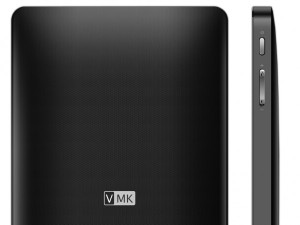 I ran into this recent article from the sharp African Tech Evangelist Robert Alai discussing the topic of African tablets with Professor Ndubuisi Ekekwe, an inventor who holds a patent on a microchip used in minimally invasive surgical robots. I’ve first heard about African tablets earlier this year around June from this Engadget article about the Way C, dubbed the First African Tablet (which as with any “First” proclamation is subject to challenge), which pleasantly surprised me as I wasn’t aware of any such initiative being started on the continent. That was the work of Verone Mankou, a 25 year old Congolese entrepreneur and the news soon made the rounds on Twitter, with good coverage in local newspapers and French media.
I ran into this recent article from the sharp African Tech Evangelist Robert Alai discussing the topic of African tablets with Professor Ndubuisi Ekekwe, an inventor who holds a patent on a microchip used in minimally invasive surgical robots. I’ve first heard about African tablets earlier this year around June from this Engadget article about the Way C, dubbed the First African Tablet (which as with any “First” proclamation is subject to challenge), which pleasantly surprised me as I wasn’t aware of any such initiative being started on the continent. That was the work of Verone Mankou, a 25 year old Congolese entrepreneur and the news soon made the rounds on Twitter, with good coverage in local newspapers and French media.
What was even surprising to me was the mini controversy that soon followed as some critics questioned the “African” epithet in African Tablet due to the fact that even though the tablet was designed by an African, it was manufactured in China. I did not see the point of such an argument, iPhones are manufactured in China, yet they are not called Chinese phones. I guess the point of that argument could be more targeted at the fact that no new component was created by an African and the tablet is just assembled from existing components but that point is still moot with me. I am more encouraged by the fact that a tablet is being brought to market by an African, for the African market, than in how it is made. This is a starting point and it is needed. The Chinese started with R&D, Repatriated and Duplicate, and knowing how to reverse engineer can be a good starting point to innovation.
So when I read Robert’s article, I learned two new things: first that I was not the only one feeling that way, and second that there were other African tablets being released (Kaboo by a Kenyan, and Encipher/INYE by a Nigerian, Nigeria has also the Ovim tablet). Robert writes that:
Some of the claims from the pundits and journalists were that the Kenyan, Nigerian or Congolese could not have launched or managed to design a tablet so soon without 2 or so years of R&D. Most of these arguments were lame and just brought out the stupidity of the bloggers, pundits and journos. They forgot that many Africans have created far greater ideas without having to go the formal way of innovation.
Harsh terms but it illustrates the irritation that these arguments did indeed evoke in me. In the video accompanying the article, Robert discusses that issue with Professor Ndubuisi Ekekwe, dubbed by Robert as “one of the great young African minds out there”, and Professor Ndubuisi agrees:
He wondered why Africans should be forced to produce new processors, screens and other parts of a tablets while others have already done so. Ndubuisi is of the opinion that to create some of these ideas you just need to know how to assemble a product, make it look African and solve African problems. Africans need not reinvent the wheel.
In my computer science curriculum, this was one of the mantras that was stressed and oft repeated: “Do not re-invent the wheel” so creating a tablet from existing components totally makes sense to me. I hope these initiatives do indeed capture the market and grow because tablets can be used in Africa for example at the education level, and this is one of the goals of Project Elimu, an open source SaaS School Administration & Management initiative by Coders4Africa, the non profit I work with. Having tablets mass adopted and incorporated in the African public psyche the way mobile phones are is key in ensuring that we can create solutions that make sense in our context.
Leave a comment